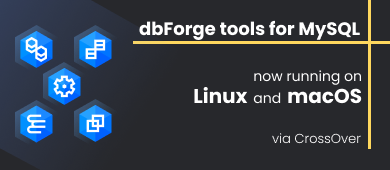Meet the long-awaited release of dbForge tools for MySQL. We have enhanced them with a few new features that will surely come in handy. However, the foremost thing in this update is that our tools now can run on Linux and macOS through CrossOver, a solution that helps launch Windows applications on different operating systems.
We are thrilled to announce that our MySQL tools are now available for Linux and macOS users via CrossOver. We sincerely believe they will like dbForge products as much as our Windows users do. Additionally, to expand the compatibility of our products even further, this release brings support for the current development series of MariaDB – namely, MariaDB 10.9.
Data Compare
dbForge Data Compare is one of the Devart tools that make working with MySQL databases a whole lot easier and faster. It allows you to visualize the differences between the databases. That can be particularly useful if you have different DBs that serve different purposes: Development and Production, for instance. With Data Compare, you can compare databases, analyze comparison results, generate synchronization scripts, and apply changes in a blink of an eye.
Support for Linux and macOS using CrossOver
The features of dbForge Data Compare become available not only to Windows users but also to those who prefer Linux and macOS. It became possible thanks to its compatibility with CrossOver.
Connectivity support for MariaDB 10.9
There are even more improvements for Data Compare in this release—support for MariaDB 10.9 included.
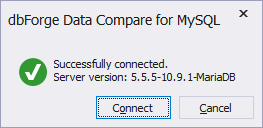
Data Generator
dbForge Data Generator is another convenient GUI tool that has been improved in this release.
Support for Linux and macOS using CrossOver
Data Generator is now available for Linux and macOS by means of the abovementioned CrossOver.
Connectivity support for MariaDB 10.9
MariaDB 10.9 is also supported by Data Generator from now on.
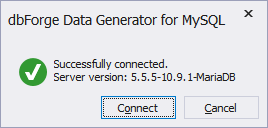
Documenter
dbForge Documenter is yet another tool that has been improved in the latest release. With this tool, you can easily create documentation for an entire MySQL or MariaDB database, as well as fine-tune it.
Support for Linux and macOS using CrossOver
The multiplatform support is now available for Documenter as well. Feel free to try this tool on Linux and macOS.
Connectivity support for MariaDB 10.9
Documenter has been updated to support MariaDB 10.9 in the latest release along with the other dbForge solutions.
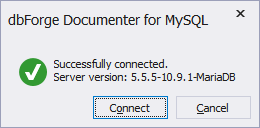
Support for ASC and DESC for index columns
Another important Documenter update brings support for ASC and DESC for index columns.
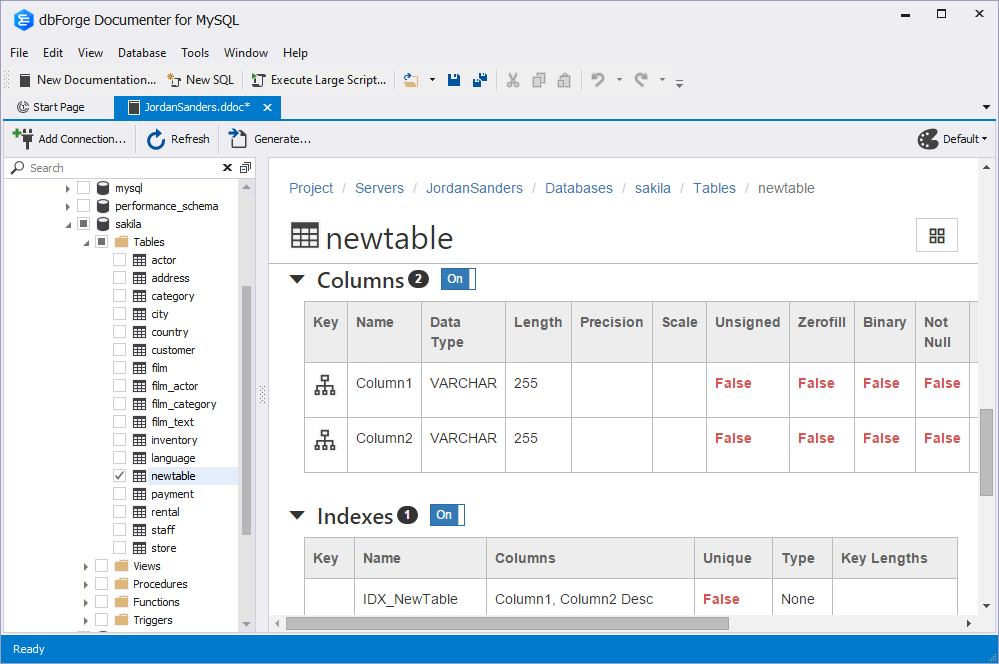
Query Builder
dbForge Query Builder is designed to create and visualize any sort of MySQL query, from simple lookups to complex JOINs. This tool provides broad compatibility options that have become even broader with this release.
Support for Linux and macOS using CrossOver
It’s high time the Linux and macOS users tried dbForge tools and saw their advantages in action. Starting with this release, they can do so with the help of CrossOver.
Connectivity support for MariaDB 10.9
Along with the other tools, Query Builder has been updated to support MariaDB 10.9.
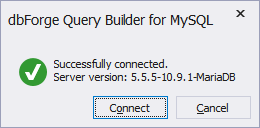
Schema Compare
As the name suggests, dbForge Schema Compare allows comparing MySQL database schemas. It can be rather useful for comparison and deployment of database structures and scripts folder differences.
Support for Linux and macOS using CrossOver
The CrossOver solution is now supported by Schema Compare as well.
Connectivity support for MariaDB 10.9
Another improvement is the support for MariaDB 10.9.
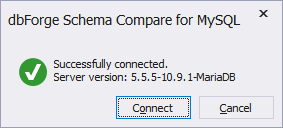
Improved comparison and synchronization of integer data types on MySQL 8.0.17 or higher and Percona 8.0.17 or higher
Among other improvements, we have updated the comparison and synchronization of integer data types: SMALLINT, MEDIUMINT, INT, and BIGINT. Now, if you compare such data on MySQL or Percona 8.0.17 (or higher), the columns will be considered equal.
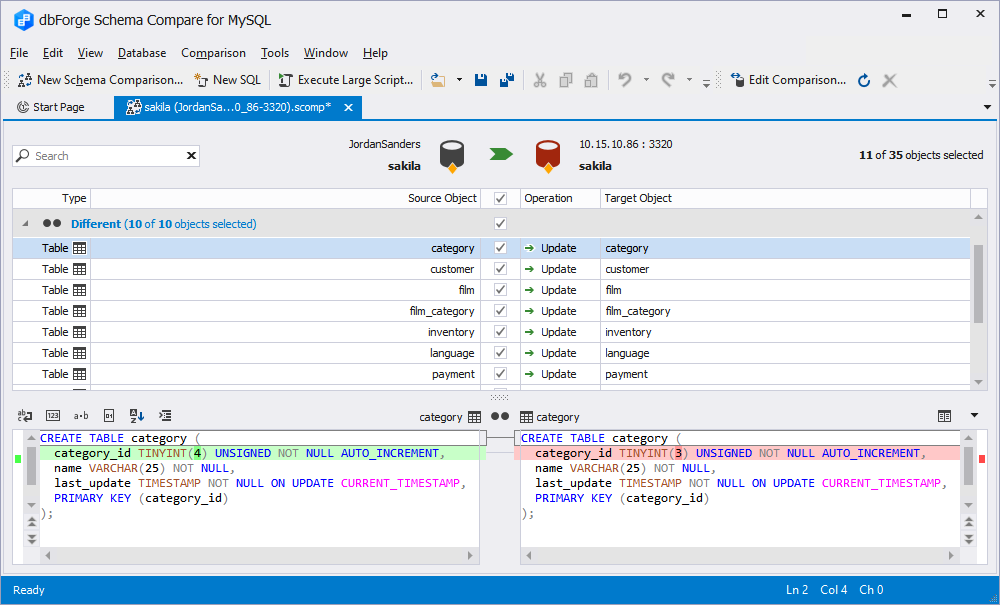
Support for ASC and DESC for index columns
Just like in Documenter, you can now sort index columns in ascending and descending order in Schema Compare.
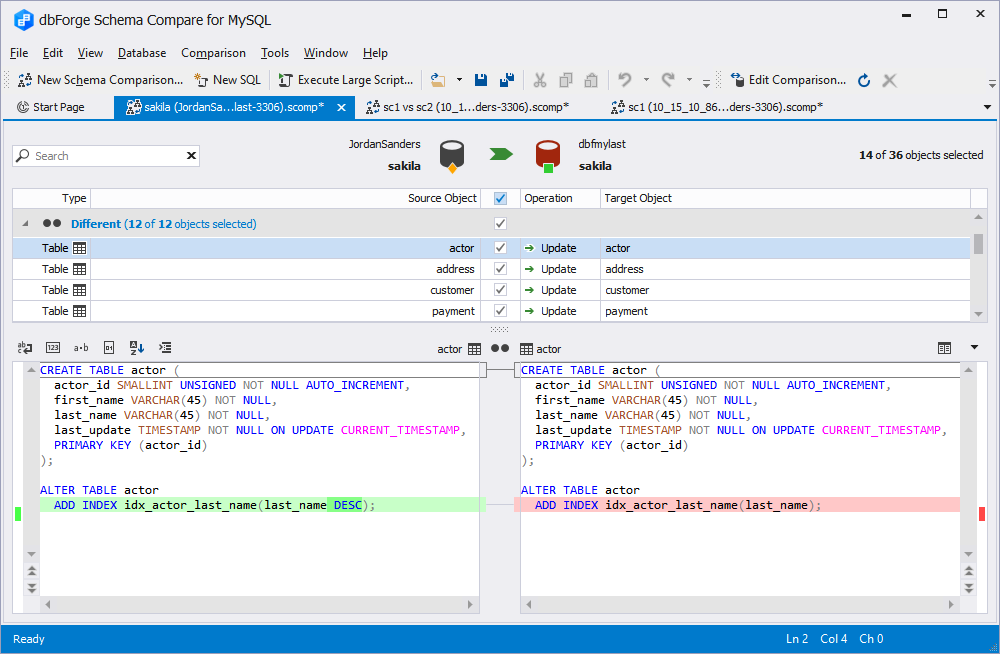
Conclusion
To sum up, the long-awaited update for dbForge tools for MySQL is finally out. The biggest thing in this release is that Windows is not the only supported OS anymore: Linux and macOS are also included from now on. To check it all out, get the update directly from the product you are using: click Help and select Check for Updates on the menu.

